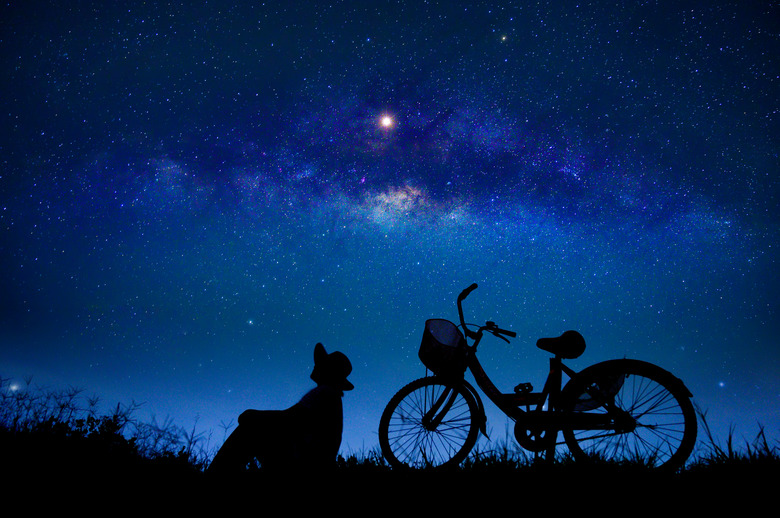The World's Richest Man Plans To Start Building Homes – In Space
Trillions of people living in millions of space colonies – that's what Jeff Bezos, Amazon CEO and owner of rocket company Blue Origin, envisions for the future of humanity.
Bezos detailed his vision in a May 9 media event in Washington, D.C.: massive space colonies, capable of supporting all types of ecosystems, floating around Earth, according to an article in Inverse.
"This would be an incredible civilization," Bezos said at the event, as reported by the New York Times.
The Moon's Just the Beginning
The Moon's Just the Beginning
Those space colonies would exist by and for future generations, but Bezos plans to start building the infrastructure now. He's starting with a lunar lander called Blue Moon, which he revealed at the media event. The lander is designed to carry people and cargo to the moon, and should be functional by 2024.
"We are going to build a road to space," Bezos said at the event, "and then amazing things will happen."
His 2024 deadline stems from an idea put forth by Vice President Mike Pence, who said President Donald Trump wants the United States to send astronauts back to the moon by then, according to the New York Times.
However, this moon excursion would mark just the beginning of Bezos' space endeavors. His ultimate goal, according to NBC News, is to find a new home in space for humanity.
Why We Need Space Colonies
Why We Need Space Colonies
The human race faces short-term problems like pollution and poverty, which require solutions in our current home, Bezos said at his event.
"But there are also long-range problems, and we need to work on those, too," he said. "They take a long time to solve. You can't wait until the long-range problems are urgent to work on them."
First and foremost, Bezos worries about energy sources. Humans' technological progress hinges on a constantly growing supply of energy, he said. but we're on track to tap out all reasonable energy sources on Earth within the next couple hundred years.
Bezos' solution: Ditch Earth.
What They Would Look Like
What They Would Look Like
Bezos structured his idea around colonies originally proposed by physicist Gerard O'Neill.
Mankind would move into millions of mileslong space structures, each holding at least a million people. Continuous sunlight would sustain these colonies, along with vast resources available on the moon, asteroids and other parts of the solar system.
Each colony would offer a "pleasant" place to live, mirroring Earth-based cities. The structures could house high-speed transit systems, farms and means of recreation, as reported by Inverse. People would be able to travel between colonies quickly and easily.
In Bezos' vision, mankind would remove all heavy-duty, damaging industry from Earth, leaving it a destination for recreation and light industry, readily available for visitors.
To make these visions reality, humans will have to drastically reduce the cost of space launches and utilize more in-space resources, since it would be too difficult to lift all resources from Earth.
Reactions to Bezos' Plan
Reactions to Bezos' Plan
Bezos' presentation at the Washington, D.C., media event garnered immediate criticism, with some objecting that Bezos had exaggerated the world's increasing demand for energy while ignoring his own company's negative contributions to sustainability and climate change on Earth.
However, his plan received praise, too. Many experts in the space community reacted enthusiastically. NBC reported that Al Globus, former NASA contractor and National Space Society co-director, called the vision "fantastic."
References
- The New York Times: Jeff Bezos Unveils Blue Origin's Vision for Space, and a Moon Lander
- NBC News: Jeff Bezos Foresees a Trillion People Living in Millions of Space Colonies. Here's What He's Doing to Get the Ball Rolling.
- Inverse: Blue Origin's Jeff Bezos Details His Radical Vision for Colonies in Space
Cite This Article
MLA
Swanston, Brenna. "The World's Richest Man Plans To Start Building Homes – In Space" sciencing.com, https://www.sciencing.com/the-worlds-richest-man-plans-to-start-building-homes-in-space-13719134/. 22 May 2019.
APA
Swanston, Brenna. (2019, May 22). The World's Richest Man Plans To Start Building Homes – In Space. sciencing.com. Retrieved from https://www.sciencing.com/the-worlds-richest-man-plans-to-start-building-homes-in-space-13719134/
Chicago
Swanston, Brenna. The World's Richest Man Plans To Start Building Homes – In Space last modified August 30, 2022. https://www.sciencing.com/the-worlds-richest-man-plans-to-start-building-homes-in-space-13719134/
